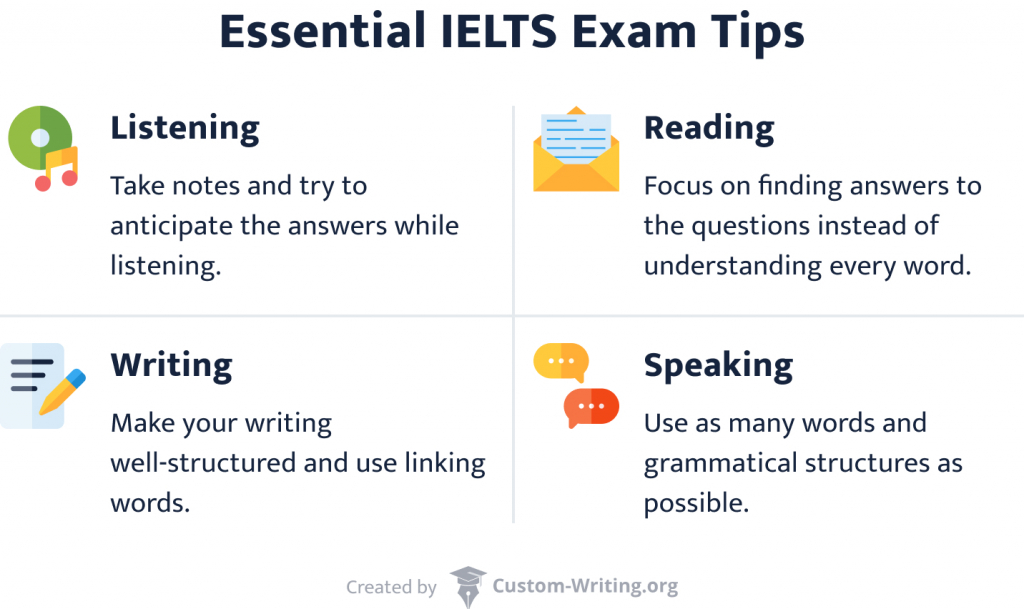This article is your ultimate guide to taking the IELTS test. Here you will find many helpful IELTS tips and tricks on how to do well in this exam.
It is worth mentioning that listening and speaking sections are the same for the Academic and General Training tests, while reading and writing parts have some differences. However, it doesn’t matter which IELTS you will take as our strategies work for both.
Our custom writing team compiled the best tips to help you get a higher score in all four parts of the exam. Additionally, you’ll find some dos and don’ts. So, let’s get started.
✅ IELTS: Tips and Tricks for Each Section
The following section contains information on listening, reading, writing, and speaking.

You will surely get better results if you stick to the following strategies. Let’s start with the tricks for taking the listening test.
🔊 Top 10 IELTS Listening Tips
Do you shiver each time you think about a listening test? Indeed, it may seem challenging. Look through the following strategies and get rid of your fears.
- Be ready to listen to the recording only once. That’s why you should stay focused during all this time.
- Use the break before listening to read and understand all the questions. Keep looking through them while listening to the audio recording.
- Be ready to multitask. You need to listen to the text, find the answers, and write them down. Practice doing all these actions simultaneously at home.
- Don’t try to grasp all the information. Concentrate on finding the answers to the given questions while listening.
- Take notes. They will help you to remember all the essential details.
- If you miss some information, don’t focus on it. Just continue listening.
- Pay attention to particular words that can help you answer the questions. Sometimes, the speaker may change the wording or use synonyms.
- If you don’t know the answer, try to guess it. It is better to write something than leave the field blank. Maybe, your guesses will be correct.
- Listen carefully to different accents.British and American accents are the most common ones. Pay attention to the pronunciation to avoid confusing words.
- Use the break after the test to transfer your answers into the answer sheet. Mind your spelling and grammar. Any mistakes will result in lowering your score.
📖 7 Essential IELTS Reading Tips
There are numerous challenges associated with IELTS Reading. Some struggle to formulate the main idea of a passage. Others don’t know how to deal with graphs and tables. Sounds familiar? If so, check out the list of practical tips below.
- Focus on finding the answers to the given questions. If you don’t know some words, don’t worry. You are not required to understand the whole text.
- Be careful while dealing with tables, figures, and graphs. Make sure not to miss any critical information. It also holds true for headings and titles.
- Manage your time wisely. Skimming through the text instead of active reading can help you finish the tasks quicker.
- Pay particular attention to the text’s introduction and conclusion. These sections usually contain the most important information.
- Find and use keywords. A keyword can help you understand what you should write about. You just need to find them in the questions. Some of them are obvious (titles, dates, and names), while others may be paraphrased. That’s why think about the synonyms or collocations that may be used instead of the given keywords.
- Mind your grammar. Even if your answers are correct, you may get a lower band score due to poor grammar. Make sure to avoid it.
- Answer all the questions. You may not know the exact answer, but you can guess correctly.
✍️ IELTS: Writing Tips for Getting a High Score
Do you know how to structure your essay? What about choosing the writing style or using the linking words? Regardless of your answer, check out these helpful strategies.
- Pay attention to the word count. You should write 150 words in Task 1 and 250 words in Task 2. Writing fewer words will result in you getting a lower score.
- Use your synthesis skills to succeed in Academic Task 1. Try to divide all the necessary information into smaller parts. When analyzing a graph, focus on answering questions such as: What is the place? What is the main idea? What are the outcomes? They will help make your paper structured and logical.
- Choose an appropriate writing style. Usually, a formal style is required for the Academic test. But if you are going to take the General Training test, you may use a personal, semi-formal, or formal style.
- Mind the structure of the letter in General Training Task 1. Your letter should include a short introduction, three body paragraphs with one idea per each, and a concluding statement.
- Use linking words. Such words and word combinations as in addition, also, as well as, firstly, finally, for example, in other words, obviously, despite, still,and in conclusion will add some extra points to your general score.
- Use the question sheet reasonably. You can write your essay plan and a draft there. However, don’t forget that the examiner checks only your answer sheet. Make sure to save enough time to transfer your essay.
- Mind your handwriting. The examiner should be able to understand what you wrote. So, it’s better to use capital letters to make things easier for them.
- Plan your essay before writing it. It will help organize your ideas effectively. Try to spend at least 3 minutes on planning.
- Make your essay well-structured. It is crucial to present the facts logically and coherently. To do so, divide your text into paragraphs: introduction, several body paragraphs, and conclusion. Don’t forget that each body paragraph should cover only one idea.
🗣️ IELTS: Speaking Tips to Help You Pass the Exam
Some people find a speaking test to be especially challenging. Indeed, talking to an examiner face-to-face may be stressful. However, the following speaking strategies are here to help you overcome your fears.
- Mind your speech fluency. What you say is not as important as how you say it. Examiners will be evaluating your language skills rather than your ideas.
- Demonstrate your vocabulary related to the topic. Use as many words as possible to show your speaking ability. Also, enrich your language with collocations.
- Use filler words. They will help you to avoid an awkward silence. Need more time to think over the answer? Paraphrase the question or just say: let me see, let me explain, what do I think about it, well, and in my opinion.
- Structure your speech. Make use of linking words. It’s a good idea to say nevertheless, however, moreover, or furthermore while expressing your thoughts.
- Don’t panic. Made a mistake? If possible, try to correct yourself. Need extra time to think over your answer? Ask the examiner to repeat the question.
- Before you start speaking, take a deep breath. This trick can help calm down and be focused.
📝 IELTS Test Day: Dos and Don’ts
We have already discussed strategies related to each part of the exam. Do you need some general tips on how to get ready the day or morning before the test? Here they are:
We hope you’ve learned valuable strategies from this article. All these IELTS tips and tricks are here to prepare you for your exam day. So, let’s sum up the key points:
- don’t be afraid;
- think positively;
- prepare well for the exam;
- read all the strategies mentioned above.
And let us tell you something: a combination of effective preparation and a positive attitude will surely make you a winner. Good luck with your IELTS!
Further reading:
- A Complete Guide to Essay Writing—Make it Simple
- Common Mistakes in Essay Writing—Errors to Avoid [Updated]
- How to Improve Your Test-Taking Skills: Top Tips & Strategies
- Words per Page: How to Count & Control
🔍 References
- On Test Day: IELTS.org
- IELTS Reading Test: How to Manage Your Time: IDP Global
- Test Day Advice: Take IELTS: British Council
- Examiner Approved Tips for the IELTS Speaking Test: IELTS Australia
- 5 Top Tips for Scoring High on the IELTS Reading Section: FluentU
- IELTS Writing Task 1: Everything You Need to Know: IELTS Advantage




![Unexpected Career Tips from Celebrities [2026 Edition]](https://custom-writing.org/blog/wp-content/uploads/2021/01/Career-tips-title-1-284x153.jpg)






![Internship Essay: Example & Complete Writing Guide [2026]](https://custom-writing.org/blog/wp-content/uploads/2020/12/internship-student-e1565190155561-284x153.jpg)
Nice article because the points you discussed are very helpful for IELTS beginners.